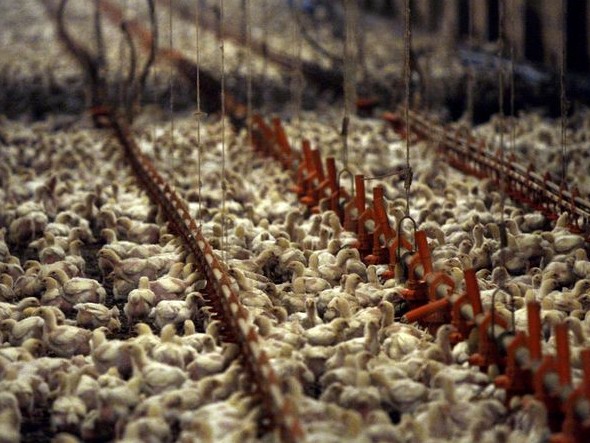I unfortunately have to see and smell the disgusting, filthy conditions which farm animals are raised in on industrial farms in Northern Colorado. Industrial farming was invented here, and it is hideous and inhumane. As a result, I will only buy free-range meat.
Your Steak Is Addicted to Drugs
Meatpacking giant Tyson recently grabbed headlines when it announced it would no longer buy and slaughter cows treated with a growth-enhancing drug called Zilmax, made by pharma behemoth Merck. Tyson made the move based on “animal well-being” concerns, it told its cattle suppliers in a letter, adding that “there have been recent instances of cattle delivered for processing that have difficulty walking or are unable to move.” According to the Wall Street journal, Zilmax (active ingredient: zilpaterol hydrochloride) and similar growth promotors are banned in the European Union, China, and Russia
When I lived in Boulder County, you could always predict imminent snowstorms by the smell of Greeley moving in as the winds shifted to the Northeast.



While I disapprove of factory farming myself, isn’t it part of the price we have to pay to feed an ever-growing world population at prices which most people can afford?
Most of these farms have plenty of land. The farmers are just too lazy to deal with rounding the animals up.
Hideous and inhumane? Yes, but that is merely scratching the surface of a society that has lost its soul. Obamacare is about to recreate the wonders of the UK’s NHS, where doctors are prematurely ending the lives of thousands of elderly hospital patients because they are difficult to manage or to free up beds. The Liverpool Care Pathway is a method of “looking after” terminally ill patients that is used in hospitals across the UK. This is the methodology that starved 1,200 patients to death last year and denies adequate medical treatment to another 130,000.
I worked at an establishment very close (about 500 yards) from one of these chicken concentration camps. And truly the muck, dead chicks, and the smell that came out of the place was beyond belief.
And the building I was in had $80,000 (circa 1990 prices) worth of double filtered, deodorize air conditioning (for 3 medium sized offices). But that didn’t stop the stink on the days when the wind was blowing towards our building and the effluent truck came around. I soon change employer.
These places do not have to be as bad as this. If other countries can clean-up their farming practices, it’s about time the US did that same.
Amen!
Looks like any large city to me.
I too eat only organic or at least free-range. I would guess that all those injected hormones and other drugs don’t really have a beneficial effect on me anyhow.
Battery cage chicken farms were banned in the EU about two years ago. One of the few good things that have come out of being a member of the EU.
I saw a documentary called “Food Inc.” that explained that the problem is not that the farmers are lazy, but that the buyer (who has pretty much a monopsony) demands the seller to fullfill certain “efficiency standards”. And the demands get tougher and tougher. More animals in less space.
I may be wrong, but I think that the rules on battery cage chickens have been adopted in the UK before they were adopted in at least some of the rest of the EU.
http://www.telegraph.co.uk/earth/earthnews/8986255/French-farmers-ignore-battery-hen-ban.html
“British egg producers have all switched from the controversial “barren battery cages” at a cost of £400 million, but fear that their businesses will be hit by an influx of cheaply-produced European imports from farms which have failed to comply. “
There is a legal definition for ‘organic’ food. Is that true for “free range?” If so, is that definition meaningful?
If not, the kill-it-and-grill-it philosophy is the only realistic alternative for carnivorous urban dwellers, who do not buy into the placebo “free range” labels. Sight in their .30-30s in the Fall, and then go deer hunting on the nearest National Forest land.
Be sure to take the appropriate NRA course first, and to wear your orangle vests. Also be careful not to shoot any horny-looking hikers or mountain bikers. 🙂
I was doing a lot of work in Greeley in the early ’90s and there were a few times when I literally almost puked. That’s when we switched to free-range, “humanely raised,” etc.
I’d heard that Greeley finally cleaned up its act; guess I was misinformed.
But if we are going to have a successful non-factory livestock movement, the Commerce Dept. will need to get extremely vigilant about cheap imported products.